Robert Bentley terminates Spencer Collier as head of Alabama Law Enforcement Agency
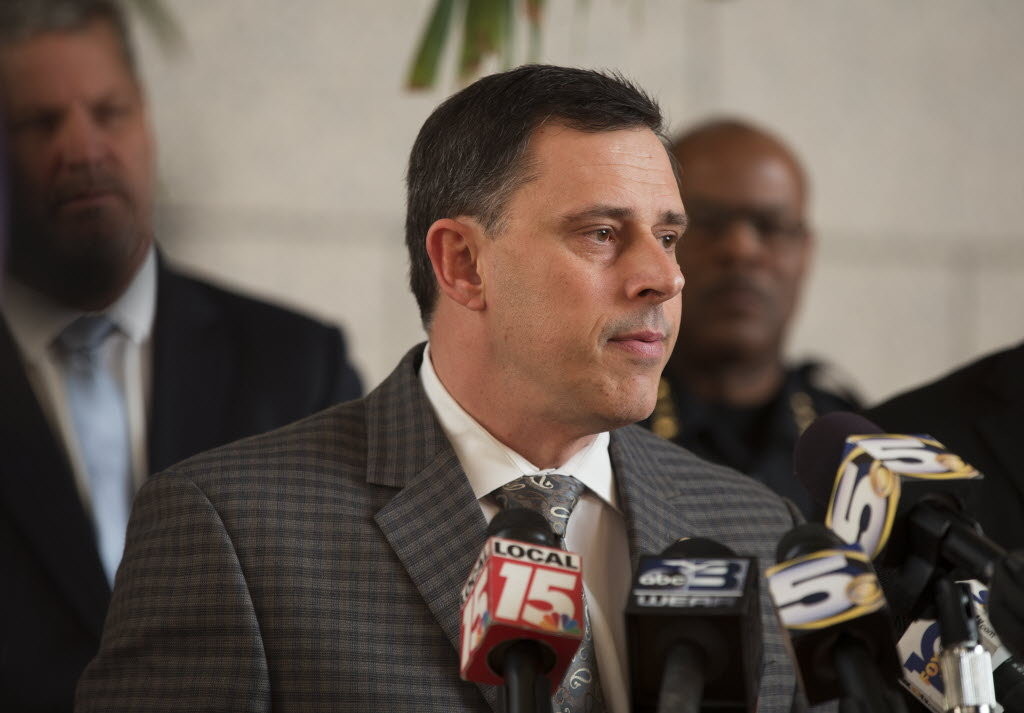
Following reports from multiple news agencies that an internal investigation had uncovered a possible misuse of funds in the Alabama Law Enforcement Agency, Gov. Robert Bentley announced the termination of ALEA Secretary Spencer Collier Tuesday. According to a statement from Bentley’s office, Collier was placed on medical leave a few weeks ago to recover from back surgery. It was during that time that Acting Secretary Stan Stabler uncovered “several areas of concern in the operations, policies and procedures at ALEA.” An internal review by the ALEA Integrity Unit discovered the possible misuse of state funds, though further details are scarce at this time. “Spencer Collier and I have served together a long time, dating back to my time in the Alabama House of Representatives,” Bentley said in a press release. “He is a friend of mine, and led the implementation of the consolidation of state law enforcement functions into one singular agency, the Alabama Law Enforcement Agency (ALEA). I appreciate Spencer’s service to the State of Alabama.” Collier contends that he has done nothing wrong and believes an outside investigation by the Attorney General’s office will prove that. Stabler has been appointed to the top spot in the department effective immediately. Since the announcement of Collier’s termination, he has accused the governor of instructing him to lie to the Attorney General’s office in regard to the ongoing corruption scandal surrounding House Speaker Mike Hubbard (R-Auburn). Bentley asserts that such allegations are unfounded.
Judge grants delay for ethics trial of indicted House Speaker Mike Hubbard

A judge is delaying the ethics trial of Alabama House Speaker Mike Hubbard for two weeks until mid-April. Lee County Circuit Judge Jacob Walker ruled Thursday that he will push back the trial until April 11 after the defense appeals some of his pre-trial decisions to the Alabama Supreme Court. Hubbard was scheduled to go to trial March 28 on felony charges of using his office for personal financial gain. Defense attorney Bill Baxley argued that additional delays might be needed. Baxley says Hubbard’s current legal team has only been on the case for a few months and may need more time to prepare. The judge agreed to only a brief delay. Walker told lawyers to be ready with questions for potential jurors on March 28. Republished with permission of the Associated Press.
Despite Democrats’ opposition, General Fund budget has its day before the House

Taking a strategy from last week’s playbook, Alabama House Democrats began a filibuster as the Special Order Calendar was brought up for discussion. The calendar includes the General Fund budget, which raised the ire of Dems because of its lack of adequate Medicaid funding. The current budget leaves in place an about $100 million shortfall in the Medicaid budget and will obliterate plans announced by Gov. Robert Bentley to institute a Regional Care Organization (RCO) program in the state. Both Bentley and House Speaker Rep. Mike Hubbard (R-Auburn) have signaled that there will likely be a special session called to address the shortfall in Medicaid. According to statements made by Hubbard, Republicans are slow to fully fund the Medicaid program because it puts a strain on all other state agencies. Along with prisons, Medicaid takes up about 62 percent of the state’s budget. “I stand here today because I am concerned about where we are on the Medicaid budget,” said Rep. Juandalynn Givan (D-Birmingham). “Yet again, we will have failed the people who need it the most. We find money here in this state for everything in this state that we need to find it for. I still cannot fathom why we need to have a special session, yet again, to fix a problem here in this state that we should be addressing right now.” Givan noted that more than a million Alabamians receive Medicaid benefits and lawmakers should be looking at ways to raise revenue to fund the program. Rep. William Buskey (D-Mobile) referred to constituent concerns over a “bare-bones budget.” “I don’t think it’s bare bones,” Buskey said. “I think it cuts through the flesh, almost to the marrow.” “I believe healthcare is paramount to everything we do,” said Rep. Darrio Melton (D-Dallas). “Healthcare drives so much of our economic development. Let’s make health care strong.” Democrats stalled for more than two hours, but eventually a vote was taken and the Special Order Calendar was approved.
Mike Hubbard expects special session over Medicaid funding

Though the House of Representatives ended its week on a low note, as Democrats filibustered plans to bring forth a General Fund void of adequate Medicaid funding Thursday, House Speaker Mike Hubbard (R-Auburn) was enthusiastic. “I think it was a productive week,” Hubbard said. Hubbard celebrated the House’s passage of a slew of bills, as well as committee work to move the General Fund onto the House floor Tuesday, but was fatalistic in his assessment of how the General Fund will play out. According to Hubbard, Medicaid has long been syphoning an enormous portion of the state’s General Fund allocations to the detriment of other departments. He noted that most House Republicans don’t have the appetite to continue providing the increases the program has become accustomed to. “The money to appropriate is there,” Hubbard said. “The problem is that Medicaid wants all of it and then some.” Hubbard noted that he expects Gov. Robert Bentley to call a special session if the General Fund fails to fully fund Medicaid, but said it would be a mistake to call legislators back immediately after the close of the regular session. He added that it might be prudent to see how the November General Election plays out, as changes to healthcare may be on the horizon. Along with the prison system, Medicaid takes up roughly 62 percent of the General Fund budget. The only way to fund it at the desired amount, Hubbard said, would be to cut about $85 million from other departments’ budgets – Medicaid will receive an additional $15 million this year, but still faces a shortfall of roughly $100 million. “We’re not going to fund Medicaid at the expense of educating our kids,” Hubbard said. During the session, Rep. John Knight (D-Montgomery) mentioned that the state should look into raising more revenue, likely through tax hikes. However, Hubbard noted that moves to increase revenue from last year’s cigarette tax increase was difficult to pass and doesn’t believe House members would be willing to fight it out again this year. Though he believes the Democrats will filibuster the budget when it comes to the floor next week, Hubbard still thinks bringing it now is a good idea as lawmakers are still angling for passage before spring break.
Mike Hubbard, Del Marsh look back on eventful week
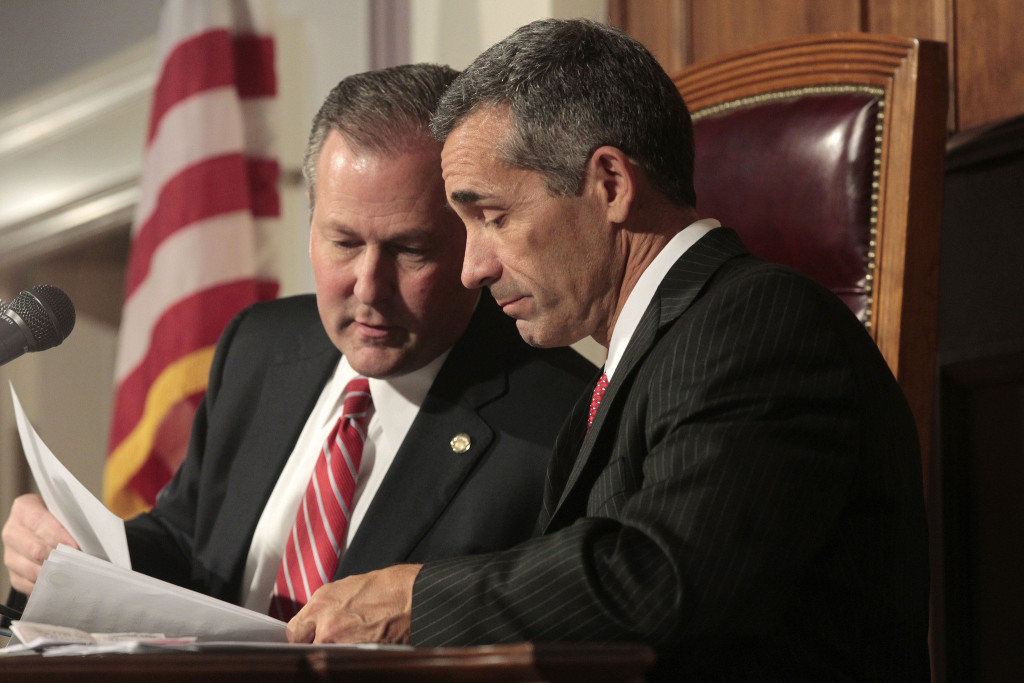
Both House Speaker Mike Hubbard (R-Auburn) and Senate Pro Tem Del Marsh (R-Anniston) seemed enthused by the amount of work accomplished in their respective chambers this week. The scene in the House was often more heated than that in the Senate, as House members took up several key Republican agenda items while Senators toiled away at a pile of Sunset Law bills. “I think it was a very productive week,” Hubbard said, praising the work of House Republicans in passing issues important to the party. Among the bills which cleared the House this week were a bill enshrining Alabama’s status as a “Right-to-Work” state in the constitution. The House also passed the “Unborn Infants Dignity of Life Act” and the “Uniform Wage and Right-to-Work Act.” All three bills faced stiff opposition from House Democrats, with the “Right-to-Work Act” from Rep. Arnold Mooney (R-Shelby) even facing defeat earlier in the session. Hubbard is looking at beginning work on the General Fund and Education Trust Fund budgets as early as next week, as well as a bill that would make Alabama the first state in the nation to provide all of its schools with internet access. Marsh echoed most of Hubbard‘s statements. “It was a great week,” Marsh said. “I think we got a great start.” Marsh praised Senators for passing a wide array of Sunset Law bills with little difficulty and a calendar which limited the amount of controversial bills coming up for discussion in the early weeks of the session. Marsh noted that it is his intention to address budget issues next week as well, along with those bills which passed through the House and Senate committees this week. Many of the bills which created discontent among Democrats in the House will likely face the same fate in the Senate, including the bill to prohibit municipal minimum wage increases from Rep. David Faulkner (R-Jefferson), which Marsh had no comment on. Hubbard, who opposes the institution of a state lottery, also hopes to see language added to the lottery bill from Rep. Alan Harper (R-Northport) to indicate where profits from the perceived lottery would be directed.
House members request federal probe into Mike Hubbard ethics trial

More than 35 Alabama legislators, both Republican and Democrat, have signed on to a letter urging U.S. Attorney General Loretta Lynch and U.S. Attorney for the Middle District of Alabama George Beck to open a U.S. Department of Justice investigation into aspects of House Speaker Mike Hubbard‘s ethics trial. According to the letter, Miles M. “Matt” Hart, an attorney in the office of Alabama Attorney General Luther Strange, has been allowed to “improperly use a grand jury” in efforts against Hubbard. Further, the letter claims that Hart has provided “selective information” commandeered through the grand jury to a political opponent of Hubbard. The letter lays out a twisted tale of corruption based on testimony from attorney Baron Coleman. Coleman was an organizer and consultant with the campaign of Sandy Toomer, who ran against Hubbard in 2014. According to Coleman, Hart provided him with “confidential grand jury information” to be used against Hubbard during that campaign. Coleman claims that he had between 50 and 100 conversations with Hart and used the information discussed therein to create a “whisper campaign” in Hubbard’s home district, Lee County. Coleman specifies that he was provided with the identities of persons appearing before the grand jury, assurances that the jury would indict Hubbard and that the Attorney General’s office had sufficient information to “counter any perceived prejudice or trouble inside the office.” The “assurances” occurred before the grand jury finished hearing testimony and Coleman claims that “each piece of information came from Matt Hart and was provided to the citizens of Lee County” by Coleman and others who believed the information to be factual. The letter goes on to say that Hart threatened to bring Coleman before a grand jury if he ever revealed that he had “a pipeline of information out of the Attorney General’s office.” Further, Coleman claims that when he was subpoenaed by Hubbard’s defense team Hart offered to work with him on answers to “potential questions regarding Speaker Hubbard, the grand jury proceedings” and more. The letter goes on to call into question the timing of Hubbard’s indictments, which occurred only two weeks before his re-election. “The timing of the indictments, coupled with Mr. Coleman’s sworn testimony and the statements if others … gives our members grave concerns that the Alabama Attorney General’s Office has used the power of its office in a coordinated effort to defeat Speaker Hubbard in his election,” the letter says. Though Strange has officially recused himself from “the matter regarding Speaker Hubbard,” and may not believe he has the power to “overrule, discipline, or investigate” Hart, the letter calls for an “unbiased investigation” to be made into the statements made by Coleman. “For the sake of all involved – including Speaker Hubbard, Mr. Hart, General Strange, and the citizens of Alabama – this matter and these claims should be thoroughly investigated by an unbiased body with the resources and experience to do so,” the letter states. “It is our hope that Attorney General Strange will join us in asking the Justice Department to conduct an investigation into these matters involving his office to ensure that the rights of Speaker Hubbard and all Alabama citizens, those rights guaranteed to us in the Constitution of the United States, are protected.” The Attorney General’s office did not immediately return requests for comment. Alabama Today has secured a copy of the letter sent to Lynch and Beck. Check out the full letter and affidavit below: Click to read full document and affidavit.
Federal officials OK multimillion-dollar waiver to state’s Medicaid program

The Alabama Medicaid Agency’s regional care organization plan was approved for a federal waiver by the federal Centers for Medicare and Medicaid Services (CMS), Gov. Robert Bentley confirmed Tuesday. The waiver will give Regional Care Organizations (RCOs) up to $328 million in federal money over a three-year period to help the state’s RCOs start and pay for projects that could boost access to medical care, improve quality and reduce costs. “Together with the Alabama Legislature, we have made significant progress in the way the Alabama Medicaid Agency operates, making it more effective and efficient,” said Bentley. “I appreciate the Centers for Medicare and Medicaid Services for approving Alabama’s plan to use regional care organizations and the National Governors Association for its help during the process.” Bentley said the state could qualify for up to an additional $420 million in federal money over a five-year period, bringing the total to more than $748 million to help start and improve its RCO program. “Alabama took bold steps towards improving healthcare in our state with our plan for regional care organizations and today’s announcement proves our efforts are paying off,” Alabama House Speaker Mike Hubbard (R-Auburn) said. “This investment could lead to a more streamlined and localized system, produce better outcomes, and save millions of taxpayer dollars in the long-term.” Senate President Pro Tempore Del Marsh (R-Anniston) agrees. “The Federal government has determined that Alabama has been innovative with our plan to transition to regional care organizations,” Marsh said. “Over time it will save the taxpayers millions of dollars and will serve as a potential modal for states as an alternative to expanding Medicaid.” Governor Bentley established the Alabama Medicaid Advisory Commission in October of 2012 to evaluate the financial stability of the Alabama Medicaid Agency. In 2013 the Alabama Legislature passed legislation based on the Commission’s work and implemented a managed care structure. In total, RCOs have been put in place in five state regions and are designed to provide care to around 650,000 Alabamians on full Medicaid. “This is a significant step in our efforts to transform the delivery of services to Medicaid patients,” Bentley continued. “I will work closely with members of the Alabama Legislature in the 2016 Regular Session to ensure the Medicaid RCO model is adequately funded so we can continue our efforts in Medicaid transformation.” The five-year agreement with CMS begins April 1.
Judge postpones hearing in Mike Hubbard case
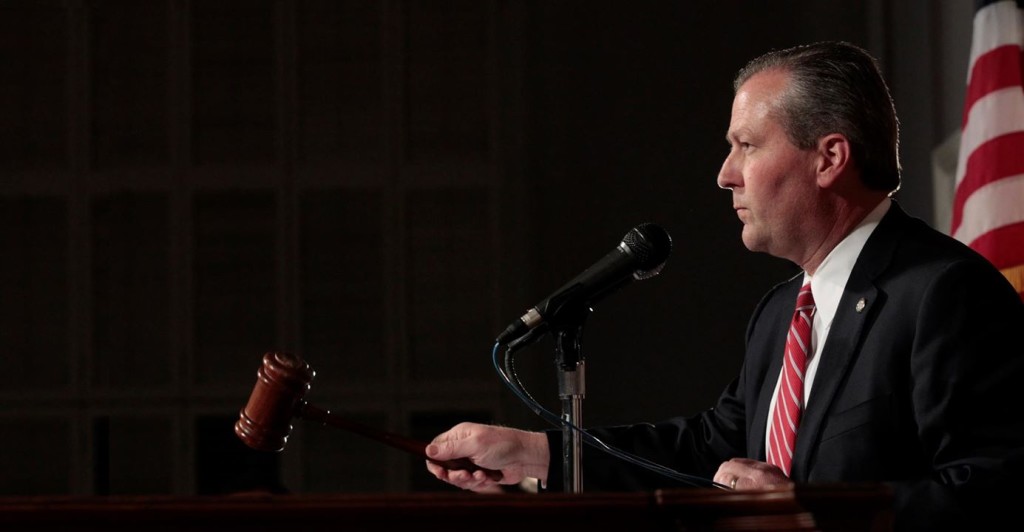
A judge has rescheduled a hearing on indicted House Speaker Mike Hubbard‘s request to dismiss ethics charges against him. Circuit Judge Jacob Walker delayed the hearing until Feb. 16 because of a scheduling conflict. Hubbard is alleging prosecutorial misconduct after a political consultant said he communicated often with the lead prosecutor and used the information to try to damage Hubbard politically. Political consultant Baron Coleman wrote in an affidavit that began a “whisper campaign” during the primary election. Coleman, in a statement, said he drew no conclusions on whether anything that transpired was illegal or unethical. Walker gave prosecutors until Thursday to file a response. Hubbard is scheduled to go to trial in March 28 on ethics charges accusing him of using his public positions to benefit his companies. Republished with permission of the Associated Press.
Indicted House Speaker Mike Hubbard asks for dismissal of ethics charges
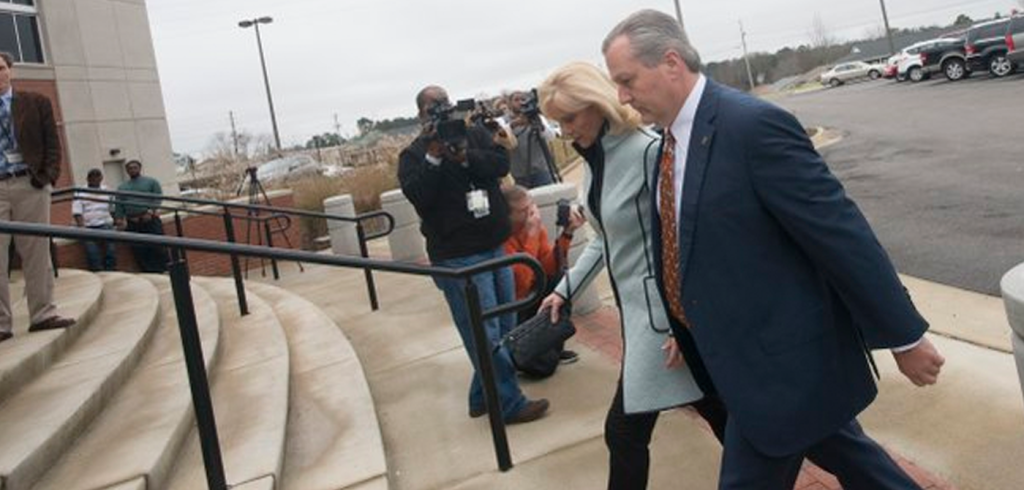
Indicted House Speaker Mike Hubbard on Tuesday asked a judge to dismiss ethics charges against him after a campaign consultant said a state prosecutor gave him information about the investigation and he used those details to try to damage Hubbard politically. Hubbard’s defense made the accusation in a motion filed Tuesday night. Political consultant Baron Coleman said in an accompanying affidavit that he had between 50 and 100 conversations with prosecutor Matt Hart about the investigation and grand jury. Coleman said he used information from Hart to start a “whisper campaign” about the ongoing investigation while he worked for Hubbard’s primary election opponent in the 2014 election. He said that included the identities of people testifying before the grand jury and assurances that the investigation would result in Hubbard’s indictment. The surprise filing came shortly after a judge struck a blow to Hubbard’s defense by refusing to dismiss the ethics case against the powerful Republican from Auburn. Hubbard lawyer Lance Bell wrote in the motion that the affidavit shows evidence of “gross misconduct” in the case. Coleman, who is an attorney, in a statement said he came forward after being approached by law enforcement and speaking with a lawyer about his ethical obligations as a member of the Alabama State Bar to disclose what happened. “I draw no conclusions about what, if anything, that happened in this case may be unlawful or unethical. Rather, I merely distilled into an affidavit some information for the judge to review and consider,” Coleman wrote. Mike Lewis, communications director for the attorney general’s office, said he could not comment on the filing because of a judge’s recently issued gag order prohibiting communication with the media. The filing was a surprise because Coleman and Hubbard had been on the opposite side of campaigns and political issues. Lee County Circuit Judge Jacob Walker on Tuesday refused to dismiss the case against Hubbard, rejecting Hubbard’s claims that the state ethics law was unconstitutional and that he was being subjected to a selective prosecution. Hubbard faces 23 felony ethics charges accusing him of using his position as speaker, and past position as GOP party chairman, to benefit his clients and businesses by lobbying the governor’s office, taking legislative action and soliciting clients and investments from major political players. Hubbard has maintained his innocence and argued that the transactions were legal. Hubbard, in seeking to dismiss the case, had argued that he had a free speech right to lobby and speak out for his clients. “Certainly, the First Amendment doesn’t protect such a conflict of interest,” Walker wrote in the order. Walker also rejected Hubbard’s claims that he was not subject to the state’s ethics law as a political party chairman, a position that is not elected, or paid, by taxpayers. Hubbard is scheduled to go to trial March 28, but the trial could be delayed if the defense appeals those rulings. Republished with permission of the Associated Press.
Republican leaders outline 2016 “Right for Alabama” agenda
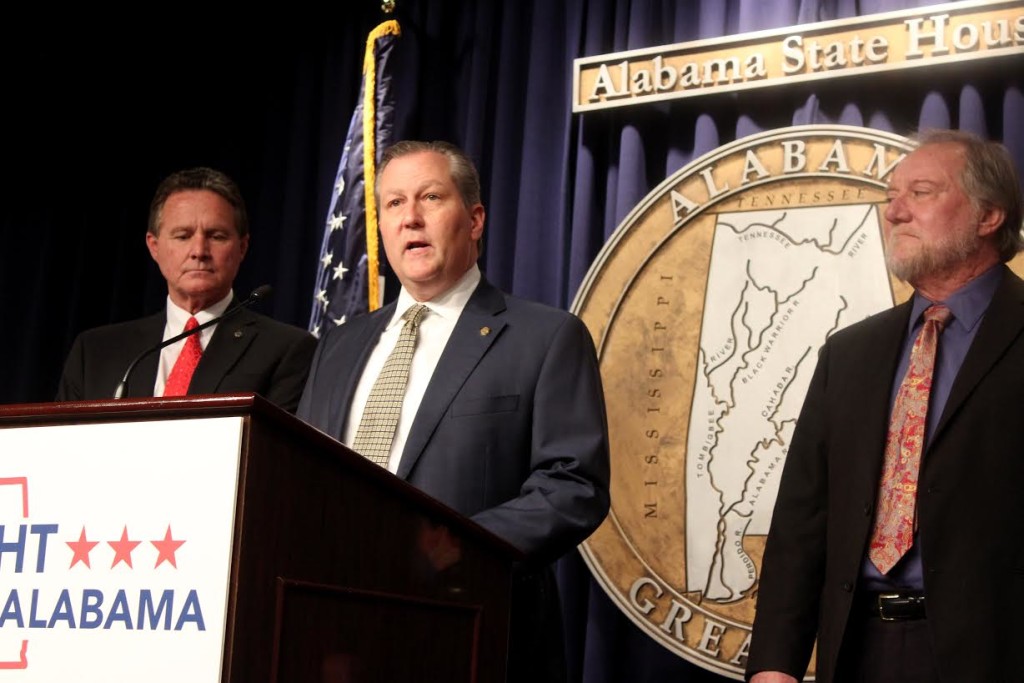
Alabama Speaker of the House Mike Hubbard (R-Auburn), alongside Majority Leader Micky Hammon (R-Decatur) and Rep. Donnie Chesteen (R-Geneva), held a press conference Thursday to lay out the Republican agenda for the upcoming legislative session. Titled “Right for Alabama,” the agenda lays out state Republicans’ priorities for the upcoming session. “Our ‘Right for Alabama’ agenda focuses on important issues like job creation, protecting public school students from harm, demanding the dignity that unborn life deserves, and other vital initiatives,” Hubbard said in a press release. “It also continues Alabama’s on-going fight against wrong-headed federal policies that would erode our constitutionally protected gun rights and force the state to accept thousands of potentially dangerous and unchecked Syrian refugees.” The first item on the agenda, and the one that all three legislators agree is most important, is a “zero-based budgeting reform,” which requires state agencies to account for each dollar received, identify ineffective programs and save or redirect taxpayer money. According to Hubbard, both the general fund and education budgets will be the first items addressed in the upcoming session. State Republicans also planb to address pension reform in an effort to “ensure the long-term solvency and fiscal health of the Retirement Systems of Alabama” and preserve the current level of benefits retirees earn. The Alabama Taxpayer Advocate Act would change a current statute, which requires the Alabama Department of Revenue to select a person from its ranks to serve as Taxpayer Advocate, to allow the governor to select the advocate from a pool of qualified candidates. The Small Business Job Creation Tax Credit would provide a $1,500 tax to small businesses for “every new, qualified employee hired by small businesses operating within the state.” Alabama’s Right to Work Constitutional Amendment will enshrine Alabama’s status as a “Right to Work” within the state constitution, declaring that Alabama is “open for business.” Republicans will also offer legislation aimed at “protecting public safety from Syrian refugee threats” and will assist members of the national Republican Party in “overturning Brack Obama’s unconstitutional executive orders attacking out Second Amendment right to own firearms.” Republicans also plan to create a School Security and Student Safety Task Force, made up of education, law enforcement and emergency management officials, to conduct a “comprehensive review and assessment of state laws, regulations, and protocols relating to security and student safety.” Though none of the legislators present would specify the amount, state Republicans also plan to work on providing teachers with a pay raise and establish the Wireless Infrastructure Renovation for Education (WIRED) Act, which provide grants to local school systems for the “purchase, installation or upgrade of wireless infrastructure.” If successful, Alabama will become the first state in the nation to have wireless infrastructure at all of its schools. Last on Republicans’ agenda is the Unborn Infants’ Dignity of Life Act, which will outlaw “the sale of the bodily remains of unborn infants.”
Prosecutors oppose House Speaker Mike Hubbard’s trial delay

Prosecutors are lashing out at House Speaker Mike Hubbard‘s request to delay his ethics trial until the fall. In a Wednesday court filing, prosecutor Matt Hart wrote that there was no legitimate reason to postpone the trial now scheduled for March 28. Hart said the people of Alabama deserve a timely resolution to whether the speaker violated the Alabama Ethics Act. Hart said the trial has already been postponed twice. Hubbard asked for a postponement after his lead attorney abruptly left the case this month. Hart argued the change did not require a continuance since Hubbard’s new lead lawyer had represented him since 2013. The March 28 trial date will fall in the middle of the upcoming legislative session. Republished with permission of the Associated Press.
Mike Hubbard seeks to delay ethics trial until fall
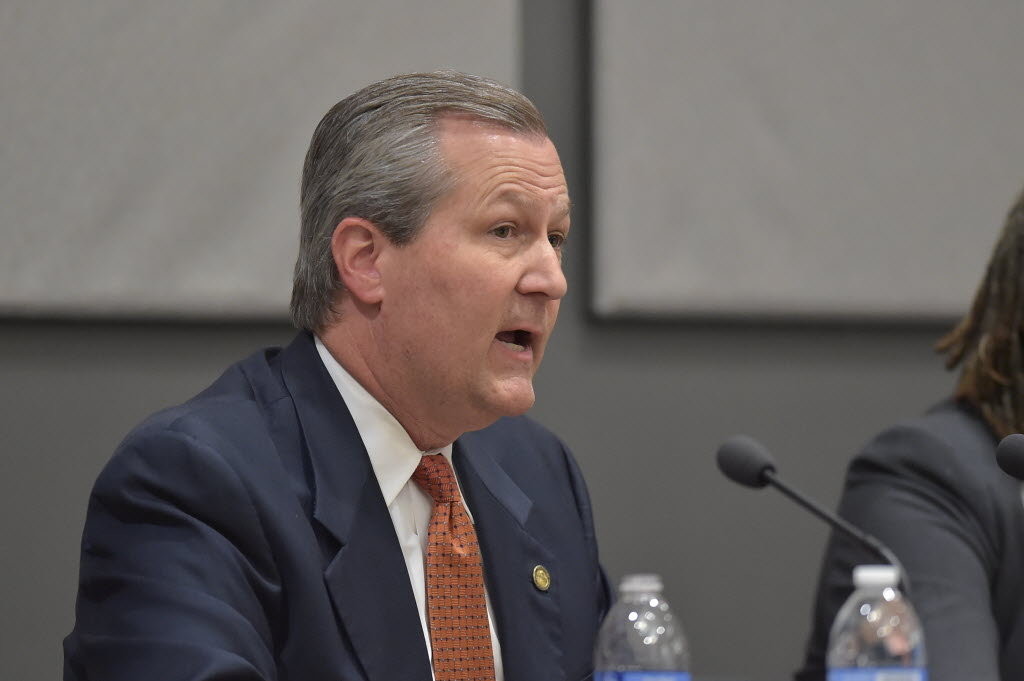
Alabama House Speaker Mike Hubbard on Friday asked a judge to delay his trial on ethics charges until the fall, after the abrupt resignation of his lead attorney from the case. Hubbard’s attorneys wrote in the motion that the remaining defense lawyers need more time to prepare, and multiple issues and motions remain to be decided ahead of trial “This case is not a routine criminal matter, as this Court is well aware,” defense lawyer Lance Bell wrote in the motion filed Friday morning. Hubbard faces 23 felony ethics charges. He’s accused of using his position as Speaker and his former post as Republican Party chairman to benefit his clients and businesses by soliciting investments and clients, and lobbying the governor’s office He has maintained he is innocent and that the transactions were legal. The powerful Republican is now scheduled to go to trial on March 28, which would require Hubbard to miss parts of the upcoming Legislative Session that begins in February. Lee County Circuit Judge Jacob Walker had given Hubbard until Friday to request a delay in the case after Hubbard’s chief lawyer abruptly resigned from the case last week. Prominent defense lawyer Mark White, who had represented Hubbard since the early days of the investigation, withdrew from the case citing an undisclosed conflict of interest. Bell wrote that the case involves a large number of documents, and many pending issues have yet to be decided. Walker has not yet ruled on Hubbard’s motions to dismiss the case. Hubbard has argued the state ethics law — which he helped pass — is unconstitutionally broad and has accused prosecutors of misconduct. Bell indicated the defense has filed two additional motions under seal. “Hubbard’s defense team is fully cognizant of its constitutional obligation to provide effective assistance of counsel and is diligently and conscientiously preparing this very complicated case for trial as soon as possible,” Bell wrote. The motion filed Friday morning criticized a prosecutor for mistakenly sending White’s sealed withdrawal motion to a reporter. The attorney general’s office told the court administrator that was a mistake and the prosecutor didn’t realize it was under seal. Walker last week issued a gag order to prohibit lawyers in the case from speaking with the media. Prosecutors indicated last week that they would oppose a delay of the trial that has already been postponed once. Republished with permission of the Associated Press.


